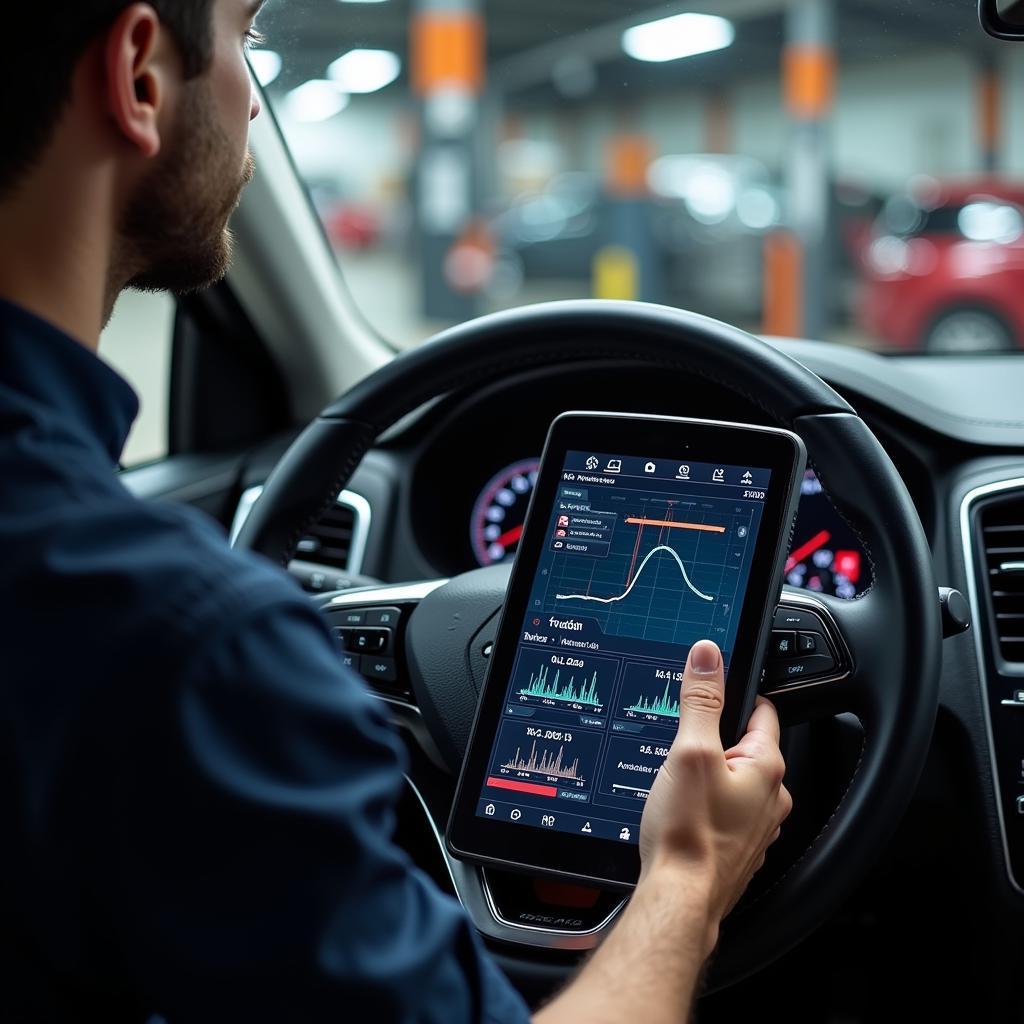AA car diagnostic, or more accurately, automotive diagnostics, is crucial for maintaining your vehicle’s health and performance. It’s the process of identifying issues within your car’s systems using specialized tools and software. From a simple check engine light to more complex drivability problems, diagnostics can pinpoint the root cause, saving you time and money on unnecessary repairs. Understanding this process can empower you to make informed decisions about your vehicle’s maintenance. This guide will delve deep into the world of car diagnostics, covering everything from basic concepts to advanced techniques.
Understanding the Importance of Car Diagnostics
Modern vehicles are complex machines with intricate electronic systems. When something goes wrong, it can be difficult to determine the exact cause without the right tools. This is where car diagnostics comes in. It provides a systematic approach to troubleshooting, allowing mechanics to quickly and accurately identify the source of the problem. This not only saves time and money but also ensures that the correct repairs are made, preventing further damage and ensuring optimal vehicle performance. Imagine trying to find a single faulty wire in a complex wiring harness – car diagnostics is like having a roadmap to that exact wire. After the initial diagnosis, further investigation is often necessary, but the diagnostics provide the critical starting point. Need to diagnose a Nissan? Check out a second diagnostic machine for Nissan cars.
Think of your car’s onboard computer system as a silent observer, constantly monitoring various sensors and components. When a problem arises, it stores a diagnostic trouble code (DTC) in its memory. These codes are the key to unlocking the mystery of your car’s ailments. A diagnostic tool can access these codes and translate them into understandable information, pointing directly to the faulty system or component.
Decoding Diagnostic Trouble Codes (DTCs)
DTCs are alphanumeric codes that correspond to specific problems within your vehicle’s systems. Each code is like a puzzle piece, providing clues to the overall picture of what’s happening under the hood. While a generic OBD-II scanner can retrieve these codes, a professional-grade diagnostic tool can offer more detailed information, including live data streams, freeze frame data, and bi-directional controls. Understanding the meaning of these codes is essential for effective troubleshooting.
For instance, a P0301 code indicates a misfire in cylinder 1. This immediately narrows down the potential causes to issues related to that specific cylinder, such as a faulty spark plug, ignition coil, or fuel injector. While the code itself doesn’t provide the exact solution, it significantly reduces the time and effort required to pinpoint the problem. This precise information allows mechanics to perform targeted repairs, eliminating guesswork and saving you money on unnecessary part replacements.
The Evolution of AA Car Diagnostic Tools
Car diagnostic tools have come a long way from basic code readers. Modern diagnostic tools are sophisticated pieces of equipment capable of performing advanced functions such as live data monitoring, component activation, and even programming. They can access multiple vehicle systems, including the engine, transmission, ABS, airbags, and more. For more specific diagnostic needs, see Colorado Springs car diagnostic.
Early diagnostic tools were simple devices that could only retrieve basic DTCs. Today, advanced tools offer real-time data streaming, allowing mechanics to observe sensor readings and system performance in real time. This dynamic view into the inner workings of your vehicle allows for more accurate diagnostics and faster identification of intermittent problems that might be missed with traditional methods. These tools can also perform bi-directional controls, allowing mechanics to activate components like fuel injectors or solenoids to test their functionality.
 Advanced Car Diagnostic Tool in a Repair Shop
Advanced Car Diagnostic Tool in a Repair Shop
DIY vs. Professional Car Diagnostics
While some basic diagnostic tasks can be performed by DIYers using affordable OBD-II scanners, more complex issues often require the expertise of a qualified mechanic with access to professional-grade tools. For specific wiring diagnostics, check out information on diagnostics to wire a car.
DIY car diagnostics can be a cost-effective way to identify simple problems. However, interpreting DTCs and understanding their implications can be challenging. Furthermore, addressing complex issues often requires specialized tools and knowledge that most DIYers don’t have access to. Professional mechanics, on the other hand, have the experience and equipment necessary to diagnose and repair even the most complex automotive problems efficiently.
colorado springs car diagnostic
The Future of Car Diagnostics
The future of car diagnostics is heading towards even greater sophistication, with the integration of cloud-based systems, artificial intelligence, and predictive analytics. Imagine a system that can predict potential problems before they even occur, allowing for preventative maintenance and minimizing downtime. This is the promise of the future of car diagnostics. Learn about the Launch car diagnostic tool for an example of cutting-edge technology.
Choosing the Right Car Diagnostic Tool
Choosing the right diagnostic tool depends on your needs and budget. Basic code readers are suitable for DIYers looking to check and clear DTCs, while professional-grade tools offer more advanced functionality for experienced mechanics. For example, if you need information on Malini car diagnostics, you can find specialized resources.
“Investing in a quality diagnostic tool is essential for any serious car enthusiast or professional mechanic,” says John Smith, Automotive Engineer at AutoTech Solutions. “It empowers you to take control of your vehicle’s maintenance and make informed decisions about repairs.”
“The ability to access live data streams and perform bi-directional controls is invaluable for diagnosing complex issues,” adds Jane Doe, Master Technician at Certified Auto Repair. “It allows you to see exactly what’s happening in real-time and pinpoint the root cause of the problem quickly and efficiently.”
Conclusion
AA car diagnostic is an indispensable tool for maintaining your vehicle’s health and performance. From simple code readers to advanced scan tools, choosing the right equipment can empower you to identify problems early, saving you time and money on unnecessary repairs. Understanding the importance of car diagnostics and its ongoing evolution will help you make informed decisions about your vehicle’s maintenance and ensure a smooth and reliable driving experience.
FAQ
- What is AA car diagnostic?
- What are Diagnostic Trouble Codes (DTCs)?
- What is the difference between a code reader and a scan tool?
- Can I perform car diagnostics myself?
- What is the future of car diagnostics?
- What are the benefits of using a professional-grade diagnostic tool?
- Where can I find reliable information about specific car diagnostic tools?
Need help? Contact us via WhatsApp: +1(641)206-8880 or Email: [email protected]. Our customer service team is available 24/7.

